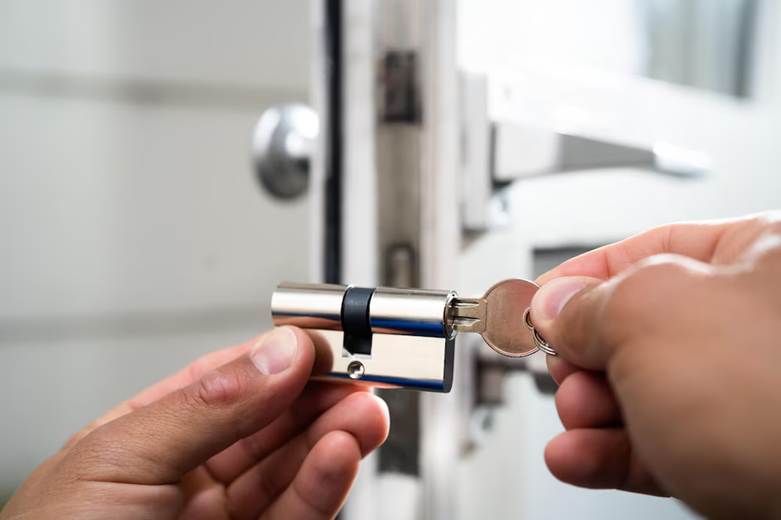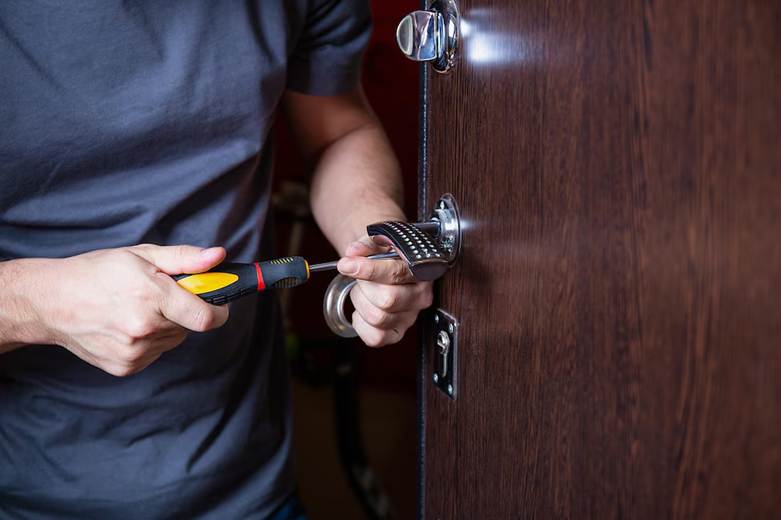Locks are one of those things most people don’t think about—until they stop working. For landlords, though, locks are part of the daily checklist. Whether you’re dealing with tenant turnover, property damage, or just a sticky deadbolt, knowing how to handle a lock situation the right way matters.
But here’s the catch: not every lock issue means you need to toss the whole thing out. Some situations call for rekeying. Others require a full replacement. And sometimes, a quick repair is all it takes. The trick is knowing which route to take—and when to call a locksmith before making it worse.
If you’ve ever debated whether to mess with the lock yourself or pick up the phone, you’re in the right place. Let’s break down what each option really means, what situations call for each, and how a professional—like All Hour Locksmith—can help you avoid costly or risky mistakes.

Rekeying: The Most Underused Security Tool
Rekeying gets overlooked a lot, and it really shouldn’t. It’s one of the smartest, most cost-effective ways to secure a property after a tenant moves out—or if you’ve simply lost track of who has a copy of the key.
What Does “Rekeying” Actually Mean?
Rekeying a lock means adjusting the internal pins so that old keys no longer work. Instead of replacing the entire hardware, you keep the lock itself but change which key opens it. It’s quick, discreet, and usually much cheaper than buying new locks.
When Should You Rekey?
- After tenant turnover: Even if they returned all copies, there’s no way to know if someone else still has a spare.
- Lost keys: If a tenant or property manager misplaces a key, rekeying prevents unauthorized access.
- Staff changes: In multi-unit buildings, rekeying is smart when maintenance staff or cleaners change.
- Breakups or domestic disputes: If a former roommate or partner might still have a key, it’s safer to rekey.
When You Shouldn’t Rekey
If the lock hardware is damaged, sticking, or clearly worn out, rekeying won’t fix the root issue. That’s when you need to look at repairs or replacement instead.
Lock Replacement: When New is the Only Option
Sometimes, you just have to start fresh. If a lock is broken, compromised, or outdated, replacement is usually the only way to go. But don’t jump to it too fast—replacing locks too often can eat into your maintenance budget.
Situations That Call for Replacement
- After a break-in: If the lock was forced or tampered with, don’t take chances. Swap it out completely.
- Hardware is damaged: Rust, corrosion, cracked cylinders—these can’t be fixed by rekeying.
- Upgrading security: If your locks are old-school or lack smart features, upgrading is worth it.
- New building codes: In some cases, especially with short-term rentals, building regulations may require higher-grade locks.
Tips for Choosing Replacement Locks
- Match the lock to the door: Not all locks fit every door. Make sure the size and type align.
- Consider key control: High-security locks offer restricted keyways, so spares can’t be duplicated easily.
- Think long-term: Investing in better locks now might mean fewer replacements later.
Lock replacement is more than just hardware shopping. A pro locksmith can help you choose locks that make sense for your building’s layout, traffic, and tenant habits.
Repair: When It’s Not Broken—Just Misbehaving
Not all lock problems need full-scale intervention. Sometimes, a lock just needs a tune-up. A loose handle, a misaligned strike plate, or a slow bolt might look like a big issue, but it can often be repaired in minutes.
Signs a Lock Just Needs Repair
- Key sticks but eventually turns
- Door needs to be jiggled or pushed to lock properly
- Loose doorknob or lever
- Lock doesn’t click shut unless slammed
These are mechanical or alignment issues—not full-on security failures. If your key still works and the lock hasn’t been tampered with, there’s a good chance repair is enough.
Why Call a Locksmith for Repairs?
Because DIY fixes usually aren’t. WD-40 and duct tape won’t save you here. A locksmith will adjust internal components, re-align doors, and spot deeper issues you may miss.
Plus, in multifamily units, a misaligned or unreliable lock can cause headaches fast—tenants call at all hours, and you’re stuck troubleshooting something that could’ve been fixed right the first time.
When It’s Not About the Lock at All
Here’s a curveball: sometimes the problem isn’t the lock—it’s the door, frame, or even the weather. Swelling doors in humid climates, sagging hinges, or misaligned frames can all mess with how a lock functions.
A locksmith can tell the difference. They’ll know whether the issue is with the lock or the structure it’s installed on, and that alone can save you time, money, and frustration.
Why Landlords Should Avoid DIY Lock Decisions
Let’s be real—locks aren’t as simple as they look. Trying to fix or replace them on your own might seem like a budget-friendly option, but it can lead to:
- Improper installations (which cause more damage later)
- Reduced security (due to misaligned hardware)
- Voiding warranty protections
- Violating tenant privacy or legal standards
Worse, if you make a mistake and a tenant gets locked out—or worse, robbed—liability can land squarely on you.
Calling a locksmith isn’t just about convenience. It’s about keeping things legal, safe, and smart.
Questions to Ask Before Calling a Locksmith
Sometimes landlords hesitate to call because they’re not sure what they’re asking for. Here are a few questions to answer first:
- Is the lock visibly damaged?
- Does the existing key still work?
- Has anyone else had access to this key recently?
- Am I dealing with one unit or multiple?
- Is there a safety or legal concern?
Knowing the answers helps the locksmith give accurate quotes and bring the right tools to get it done in one visit.
Budgeting for Lock Services: What to Expect
Rekeying a standard lock usually costs less than full replacement—and that’s one of the reasons it’s the go-to move for landlords between tenants. Here’s a ballpark breakdown (note: always confirm locally):
- Rekeying: $15–$40 per lock
- Replacement locks: $40–$150 each
- Basic repairs: $30–$100 depending on the issue
- Emergency services: Higher, especially after hours
Pro tip: build a line item into your property budget for locksmith services. That way, when an issue pops up, it doesn’t feel like a surprise expense.
Long-Term Lock Strategy for Landlords
If you’re managing more than one unit, you need a system that’s built for scalability. That’s where master key systems or keyless entry locks can come in handy. A locksmith can help you:
- Set up a master key that works across multiple units
- Digitize access with smart locks or keypad entry
- Create a rekey schedule that aligns with leases or seasons
- Install high-security locks for high-turnover units
Planning ahead keeps you out of crisis mode and gives tenants a smoother experience too.

Bottom Line: Know When to Call the Pros
You wouldn’t let a tenant DIY electrical work. Locks deserve the same respect. A jammed lock might seem like a small annoyance, but it can quickly snowball into security risks or tenant disputes.
Whether it’s rekeying after a lease ends, replacing after a break-in, or fixing that finicky knob that’s driving everyone nuts—professional locksmiths handle it right the first time.
So next time you’re on the fence, remember this rule of thumb:
If it touches tenant safety, legal access, or building security—it’s worth a call.









